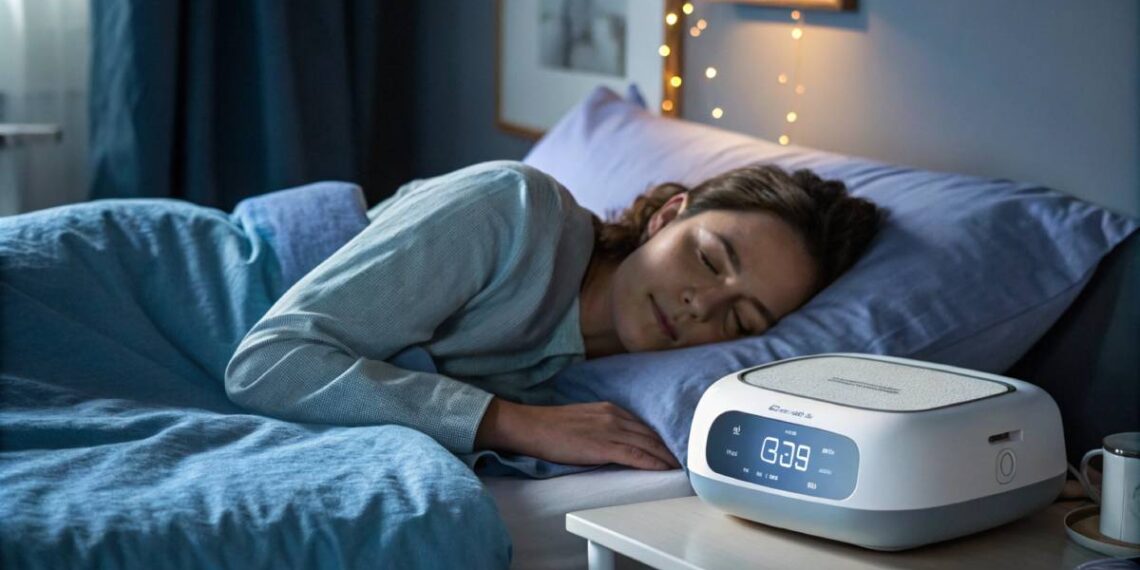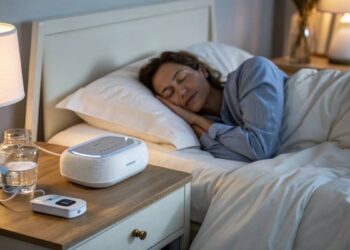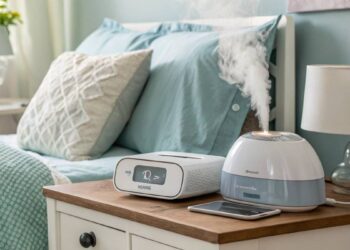Ever wondered why restless nights leave you dragging through the day? The Apnea-Hypopnea Index (AHI) could be the key to unlocking the mystery behind your sleeplessness. Imagine having a personal scorecard that reveals how often your breathing falters while you sleep. Whether it’s mild snoring or severe sleep apnea, deciphering your AHI score empowers you to take control of your sleep health. Dive into our comprehensive guide to understand what your AHI score means and how it can transform your nights—and days—for the better.
Key Takeaways
- AHI Score Defined: The Apnea-Hypopnea Index measures the severity of sleep apnea by counting breathing interruptions per hour.
- Score Interpretation: AHI ranges from normal (0-5) to severe sleep apnea (30+), each level indicating different health risks.
- Health Implications: High AHI scores are linked to serious health issues like heart disease, high blood pressure, and diabetes.
- Treatment Options: From CPAP machines to lifestyle changes, various treatments can help manage and reduce AHI scores.
- Lifestyle Factors: Sleep position, alcohol consumption, age, and weight significantly impact AHI scores and overall sleep quality.
Decoding the AHI Score
What is the AHI Score?
The Apnea-Hypopnea Index (AHI) is like a scoring card for sleep, helping to figure out how severe sleep apnea might be. It tallies up how often breathing takes a hit (either stopping completely or just slacking off) while you’re snoozing – usually counted per hour. Knowing this AHI score helps folks get a grip on how their sleep cycles might be affecting their health.
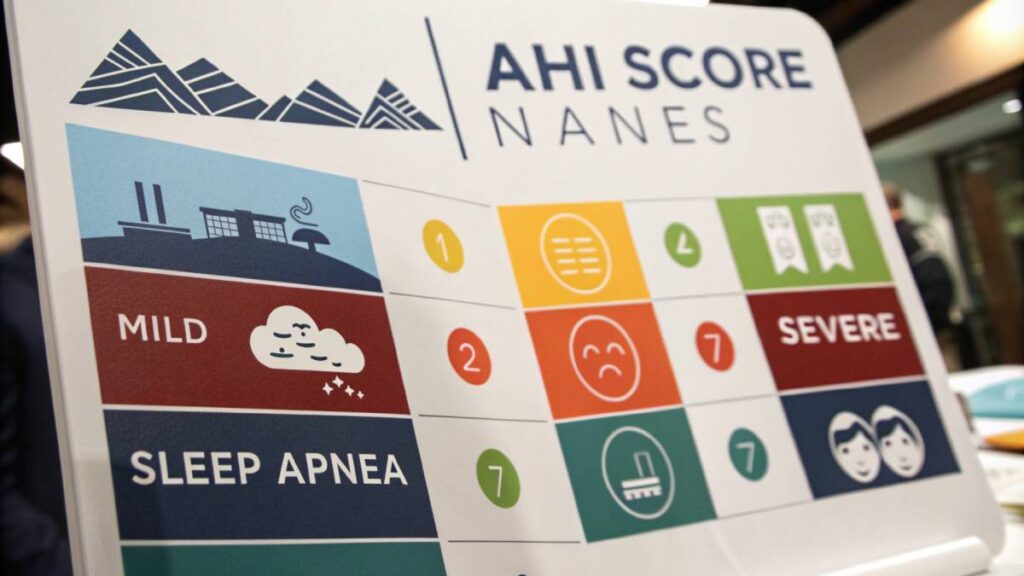
To come up with the AHI score, a sleep study or a home gadget usually gathers some z’s data. Add up those moments where breathing misbehaves and divide by total sleep hours for the average score.
| AHI Score Range | What It Means |
|---|---|
| 0 – 5 | Sleeping like a baby (Normal) |
| 5 – 15 | Light snoring (Mild Sleep Apnea) |
| 15 – 30 | Rougher nights (Moderate Sleep Apnea) |
| 30+ | Sounds like a bear (Severe Sleep Apnea) |
Importance of Understanding AHI
Learning what your AHI score means isn’t just smart, it’s vital. It clues people into how serious their sleep apnea is, nudging them towards treatment. Untreated sleep apnea is no joke – it can mess with your heart, drain your energy dry, and make you feel groggy during the day. Knowing your number might just light a fire under you to make some needed changes.
The AHI can kickstart conversations with doctors about routes like CPAP machines, shaking up your daily routine, or even surgery. Want more rabbit holes to explore? Consider checking out sleep apnea symptoms or what causes sleep apnea for more lightbulb moments on the condition.
So, this little number, the AHI score, is like a compass guiding those with sleep apnea to make smart choices about their health.
Understanding Sleep Apnea
Overview of Sleep Apnea
Sleep apnea? It’s like your body plays a nasty game of red light, green light while you’re snoozing. Breathing stops, starts, goes in slow-mo, repeats. This happens because the throat won’t stay open (obstructive sleep apnea) or the brain’s a bit lazy on breathing instructions (central sleep apnea). And for some, the body just can’t make up its mind and does both (complex sleep apnea). Symptoms to watch out for? Well, if your snoring rivals a freight train or you wake up gasping like a fish out of water, it’s time to pay attention. We’ve got the lowdown on more signs on our handy sleep apnea symptoms page.
“Sleep is the golden chain that ties health and our bodies together.” – Thomas Dekker
| Type of Sleep Apnea | What Goes Wrong |
|---|---|
| Obstructive Sleep Apnea | Throat decides to play gatekeeper |
| Central Sleep Apnea | Brain misses the memo on breathing signals |
| Complex Sleep Apnea | When both above decide to join forces |
Impact of Sleep Apnea on Health
Ignoring sleep apnea ain’t good for anyone. We’re talking more than just feeling zonked—think highways to high blood pressure, heart calamities, stroke alerts, sugar troubles like diabetes, and adding numbers on the scale. Your mood can take a hit too, with anxiety and depression sneaking in.
“The greatest wealth is health.” – Virgil
Here’s a quick peek at what untreated sleep apnea can unleash:
| Health Trouble | What’s Going Down |
|---|---|
| High Blood Pressure | Heart’s under pressure big time |
| Heart Disease | Oxygen’s cutting out, putting heart in distress |
| Stroke | Cardiovascular jeopardy’s at play |
| Diabetes | Hormones aren’t happy with blood sugar game’s |
| Weight Gain | Metabolism’s out of whack theater |
Knowing what your AHI score means can steer your treatment journey. To see what’s behind the apnea curtain, mosey over to our piece laying down what causes sleep apnea. Punching early on sleep apnea can give your health and life that much-needed boost.
Interpreting AHI Scores
Figuring out AHI scores is crucial for folks dealing with sleep apnea. This bit breaks down what these scores mean and the wake-up call they might be ringing.
AHI Score Range Interpretation
The Apnea-Hypopnea Index (AHI) is like your sleep scorecard, counting how many times you stop or struggle to breathe in an hour of snooze time. This helps in figuring out how heavy-duty your sleep apnea is. Here’s the lay of the land when it comes to AHI scores:
| AHI Score Range | What’s Happening |
|---|---|
| 0 – 5 | Business as usual, you’re good to go |
| 5 – 15 | Just a smidge of sleep apnea |
| 15 – 30 | Mid-level sleep troubles |
| Over 30 | You’re in the deep end of sleep apnea |
Seeing these numbers helps folks and docs get the picture on what’s up with those nightly zzz interruptions. Want more info on what sleep apnea feels like day-to-day? Peep our article on sleep apnea symptoms.
Severity Levels of Sleep Apnea based on AHI
Each score range is like a siren for different levels of sleep apnea trouble, guiding what to do next. Here’s a quick snapshot of what to expect:
| Level of Sleep Mayhem | AHI Score Tally | What’s Taking a Toll on You |
|---|---|---|
| All Clear | 0 – 5 | You’re symptom-free! |
| Mild Sleep Mayhem | 5 – 15 | The occasional lazy day |
| Moderate Sleep Mayhem | 15 – 30 | Sleepiness hits a bit more often |
| Big Time Sleep Trouble | Over 30 | Constant tiredness, maybe a spike in BP, watch out for heart issues |
Knowing where you stand sheds some light on how risky things might get if the score doesn’t drop. It’s a great idea to check out why sleep apnea starts to tackle it head-on.
Decoding these scores helps folks have better chats with their docs about what might help them snooze better. If you’re curious about details, you might wanna try a home sleep apnea test to see how you’re really sleeping.

Factors Messing with AHI Scores
Let’s break it down. If sleep apnea’s the villain here, understanding the stuff that messes with your AHI score is like finding its kryptonite. Things like how you sleep, a few too many sips of your favorite drink, popping certain meds, and even your age or weight can really shake things up.
Sleeping Positions
How you snooze can really rock your AHI score. Plant yourself on your back and—bam—gravity steps in like an unwanted guest, pulling your tongue and other soft bits to block your breathing. Flipping onto your side? That’s more like it—an instant chill pill for those pesky apnea episodes.
| Sleep Spot | Effect on AHI Score |
|---|---|
| Back | AHI Score Goes Up |
| Side | AHI Score Goes Down |
For a closer look on how your posing affects your z’s, peep our article on best sleep position sleep apnea.
Alcohol and Chill Pills
Had a drink or took some sedatives? Yep, they can stir the pot for your sleep apnea. By mini-relaxing your throat muscles, these substances roll out the welcome mat for airway blockages, hiking up your AHI score.
| Party Starter | Role in AHI Score |
|---|---|
| Booze | Score Up |
| Sedatives | Score Up |
Thinking about other paths than CPAP therapy? Dive into our write-up on alternatives to cpap. Trust me, it is a good read!
Age and Weight
You get older, you put on some pounds, and suddenly your AHI score’s not playing nice anymore. Flab around the neck? It’s a not-so-cool compressor for your windpipe. And let’s face it, few extra birthday candles make muscles snooze a bit more than they should.
| To-Do | AHI Score Reaction |
|---|---|
| Age Ticking Up | Score Up |
| Gaining Weight | Score Up |
If you’re sweating about weight and how it snoozes into your health, check out our insights on whether does weight loss help sleep apnea.
By knowing these AHI score troublemakers, you’re gearing up for smoother snoozing and feeling ace. Want more scoop on those sleepy time symptoms? Browse our page on sleep apnea symptoms.
Implications of High AHI Scores
So, you’ve got a high AHI score, huh? That pesky number can point to some pretty serious sleep chaos and might just be putting your health in the danger zone. Wrapping your head around what those numbers mean is super important, especially if sleep apnea’s been dangling over you like a dark cloud.
Health Risks Associated with High AHI
If your AHI number’s shooting through the roof, it doesn’t just mean you snore louder than a freight train. Here’s a taste of the trouble it might be brewing:
| Health Risk | What it Means for You |
|---|---|
| Heart Trouble | AHI on the high side? You might be looking at bumps in blood pressure, heart thumps, and even nasty stroke surprises. Don’t brush it off – those heart problems from sleep apnea are no joke. |
| Snooze & Lose | Sleepy days and nodding off during Netflix? That excessive tiredness is more than a small nap gap—it’s messing with your mojo! |
| Brain Fog | Memory’s foggy? Concentration slipping like soap in the shower? Yup, that could be sleep apnea giving your brain a hard time. |
| Metabolism Mayhem | Wrestling with weight around the belly? High AHI scores aren’t playing fair and might be dragging type 2 diabetes into the mess. Wanna know more? Here’s what’s causing your sleep apnea. |
| Mood Swings | Feeling like your emotions are on a rollercoaster? Untangled sleep apnea might be at the root of those downer days or anxious nights. |
If you’re ticking any of these boxes, hurry and chat with a doc. Tackling the issues head-on can really turn the tide on your health.
Treatment Options for High AHI Scores
Here’s the scoop on kicking those high AHI scores to the curb. It takes a combo plan, and fortunately, there are some options to explore:
| Treatment | What to Expect |
|---|---|
| CPAP Magic | CPAP stands for Continuous Positive Airway Pressure, but think of it as a breath of fresh air all night long. Not your thing? Peek at what to do if CPAP doesn’t work. |
| Mouth Helpers | Custom oral gizmos shift your jaw into gear, helping out with blocked airways. These sparkly bits might be the bright side if you want to avoid CPAP. |
| Health Kick | Shedding pounds can trim those AHI scores and give your health a high five. For more insight, hop over to weight loss and sleep apnea relief. |
| Scalpel Skills | Sometimes, going under the knife might be a way to evict tissue that’s in the way. Check how others fared at the success rates for sleep apnea surgeries. |
Before jumping into treatment, have a chinwag with your healthcare pal to nail down a plan that’s just right for you. Keep an eye on that AHI too, maybe with a handy home sleep apnea test, and keep tweaking until you hit the sweet spot.
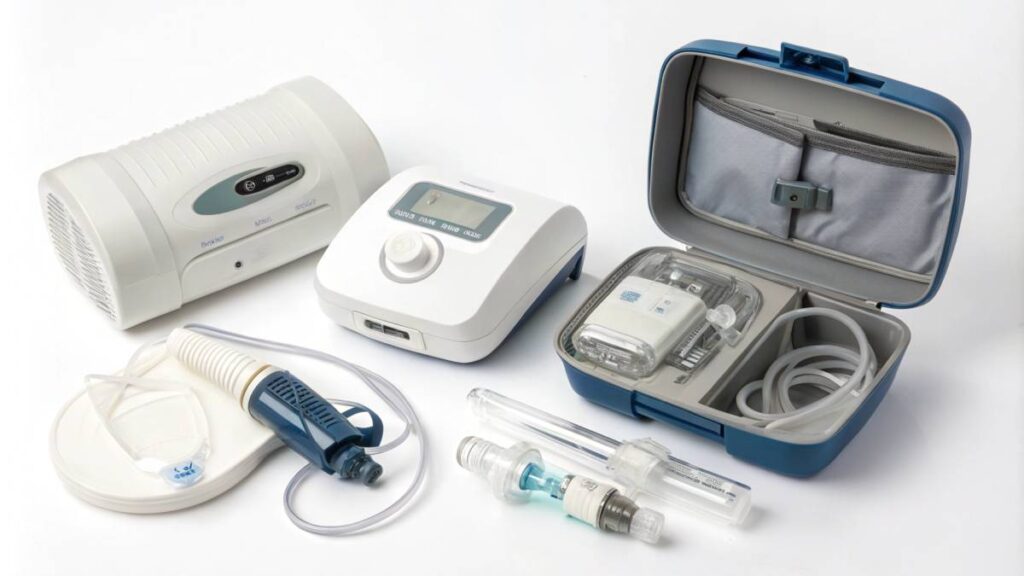
Managing and Monitoring AHI
Lifestyle Changes to Improve AHI
For those wanting to see an improvement in their AHI scores, even a few tweaks to daily habits can make a big difference in how they sleep and feel.

Key lifestyle adjustments include:
| Change | Description |
|---|---|
| Weight Management | Keeping the pounds in check can seriously ease sleep apnea symptoms. Wondering how weight ties into sleep apnea? Check out does weight loss help sleep apnea. |
| Sleep Position | Catching Z’s on your side might just be the secret weapon against apnea. Discover more tips in our best sleep position sleep apnea write-up. |
| Ditching the Booze | Cutting back on alcohol can help your airway muscles stay lively, boosting sleep quality. |
| No Smoking | Giving up the smokes? That can lead to better airway health and fewer sleep troubles. |
| Get Moving | Regular exercise isn’t just for the heart; it can perk up your sleep quality, too. Even a neighborhood stroll or a swim does wonders. |
Sure, it’s not a walk in the park to make these changes, but the payoff? Better AHI scores and feeling great.
Regular Monitoring of AHI Levels
Keeping tabs on your AHI numbers is crucial for staying on top of sleep apnea. Monitoring shows if those lifestyle swaps and treatments are hitting the mark or need a tweak.
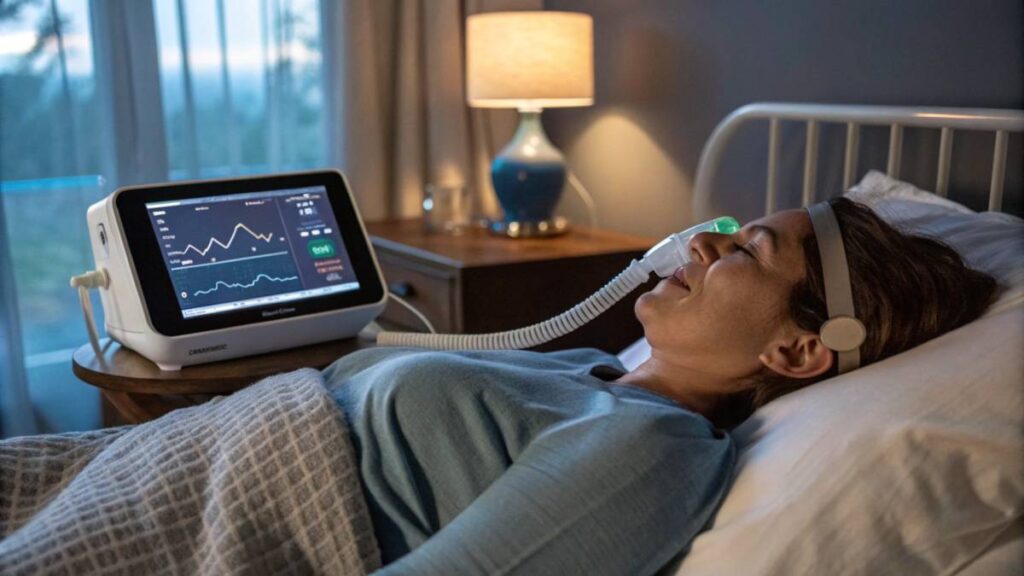
Ways to keep an eye on AHI:
| Method | Description |
|---|---|
| Home Sleep Apnea Test | Want to see where you stand? A home test might be the ticket to gauge those AHI levels. Dig into our guide on home sleep apnea test. |
| CPAP Machines | If you’re on CPAP therapy, those machines are like a sleep diary, crunching night data to show progress. |
| Doctor Visits | Popping in to see your doc? It’s a smart move to fine-tune treatments and monitor those AHI shifts. |
Knowing the ins and outs of the [ahi score meaning] helps folks stay in the loop, ensuring active involvement in their sleep health. Regular monitoring can make a world of difference for timely tweaks and long-term betterment.
Main Tips
- Consistent Monitoring: Regularly track your AHI score to assess the effectiveness of treatments.
- Healthy Weight Maintenance: Maintaining a healthy weight can significantly reduce AHI scores.
- Optimal Sleep Position: Sleeping on your side can help minimize breathing interruptions.
- Limit Alcohol and Sedatives: These substances can exacerbate sleep apnea symptoms.
- Stay Active: Regular exercise improves overall health and can positively impact sleep quality.
Final Thoughts
Navigating the complexities of sleep apnea starts with understanding your AHI score. This crucial metric not only sheds light on the severity of your condition but also guides you toward effective treatment strategies. Embracing this knowledge empowers you to make informed decisions, collaborate with healthcare professionals, and implement lifestyle changes that can dramatically enhance your sleep quality and overall health. Remember, every step you take towards managing your AHI score is a step towards brighter, more energized days. Don’t let sleep apnea hold you back—take control, seek support, and prioritize your sleep health today for a healthier tomorrow.
Conclusion
Understanding your AHI score is more than just a number—it’s a pivotal step towards reclaiming your health and enhancing your quality of life. By breaking down what each score signifies, you gain invaluable insights into the severity of your sleep apnea and the urgent need for effective treatment. From the lifesaving potential of CPAP therapy to the transformative effects of mindful lifestyle adjustments, managing your AHI score opens doors to healthier sleep patterns and, consequently, a more vibrant you. Don’t let sleep apnea dictate your days; empower yourself with knowledge, consult healthcare professionals, and embark on a journey towards restful nights and energized mornings. Remember, every small change can lead to significant improvements in your sleep health and overall wellbeing.
FAQs
What is the AHI Score?
The Apnea-Hypopnea Index (AHI) quantifies the severity of sleep apnea by counting the number of apnea and hypopnea events per hour of sleep.
How is the AHI Score Calculated?
AHI is calculated by dividing the total number of apnea and hypopnea events by the total hours of sleep, providing an average score per hour.
What AHI Score Indicates Severe Sleep Apnea?
An AHI score over 30 signifies severe sleep apnea, indicating frequent breathing interruptions during sleep.
Can Lifestyle Changes Improve My AHI Score?
Yes, adjustments like weight management, altering sleep positions, reducing alcohol intake, and quitting smoking can positively impact your AHI score.
What Treatment Options Are Available for High AHI Scores?
Treatment options include CPAP therapy, oral appliances, weight loss programs, and, in some cases, surgical interventions to reduce airway obstruction.

